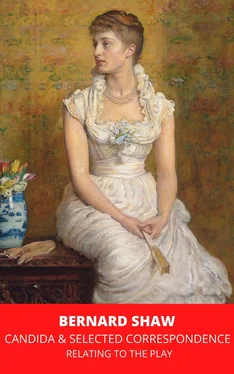I see you wont tell me anything about Prossy. It would be seething the kid in its mother’s milk, I suppose; but still I do want to know in general terms whether my style of work fits her.
It is luncheon hour, and there’s a visitor.
That letter would not have surprised anybody at the hotel. Did you ever read “ Rejected Addresses ” [by the brothers James and Horace Smith]? I only remember three lines from “ Lady Elizabeth Mugg .”
—for who would not slavery hug,
to spend but one exquisite hour
in the arms of Elizabeth Mugg!
I should write the same about you if there were any rhyme to Ellen. I love you soulfully & bodyfully, properly and improperly, every way that a woman can be loved.
GBS
69/ To Charlotte Frances Payne-Townshend later Mrs Bernard Shaw
18th October 1897
. . . This morning came an appalling letter from my Italian lady [Candida Bartolucci]—“I have seen your play [Candida]. It is beautiful. I am coming to London to congratulate you.” I must rush off to the vestry committee.
GBS
P.S. I biked to Radlett yesterday with Wallas & Ada Radford. In your absence I think I shall fall in love with Mrs Phillimore [née Lucy Fitzpatrick].
70/ To Janet Achurch
1st November 1897
My dear Janet
Have you got among your press cuttings an agonized notice of “ Candida ” from the Northern Figaro? If you have, will you lend it to me: I’ve mislaid my copy.
I have for a long time wanted to remonstrate with you about two things. First, the way you destroy every chance of getting “ Candida ” produced by persistently telling the press that it is going to be done presently in London. Of course everybody concludes that the market is closed. If only you had played the game properly, and told everybody that nobody in London would touch the play, and that only for you and the I.T. [Independent Theatre] it would never have seen the light even in the provinces, you would have made such an interesting case of it that the way would have been clear by this time. But you will play Government tricks when you’re in opposition. Making all due allowance for congenital mendacity, I still think you ought to be able to see that the strength of your position lies in its commercial weakness, and its unequalled opportunities of making capital out of persecution.
Second, and more important, your diction is in such an unholy abyss of mannerism that London will not stand you unless you drop it. When I saw “ Doll’s House ” for the second time at Islington, you inflicted such torments on me with every syllable you uttered that my affection for you finally came out by the roots. I really cannot love a woman with a sawmill at each corner of her mouth. Miss P. T. [Payne-Townshend], who had been tremendously impressed by her first visit at the Globe [Theatre], was utterly confounded, and could not believe that it was the same woman. The last time I saw you everything went well until you made a scene about something—I forget what. Immediately you started both sawmills, fixed your eyes in a ghastly stare, and became a frightful ven-triloquizing somnambulist, like the ghost of Cleopatra. This is no doubt extremely thrilling to your own diaphragm; but the effect on the innocent spectator is atrocious: it deprived me of the power of remonstrating with you; removed me miles away; set me asking myself whether it was really you or some nightmarish simulacrum of the once adorable Janet. It is that that has prevented me from going to see “ Candida ”: I daren’t face it. It is all the fault of that cursed Cleopatra. You have begun to act ; and now it’s all up with you. You complain of Thorpe’s want of simplicity and sincerity and then burlesque his worst artificialities.
I enclose you the prospectus of the plays, as it has an important bearing on “Candida.” The books will be out in the middle of January—at all events early in February. After that the novelty will be gone. . . .
GBS
71/ To Janet Achurch
9th December 1897
Janet, Janet, Janet
Is there any use in remonstrating?
Is Charrington to be ruined? Is [your daughter] Nora to make clinical observations when she comes back? Who is to play Candida?
Very well: I will tell everybody—tell Miss [Charlotte Payne-]Townshend, Mrs [Beatrice] Webb, Mrs [Lion] Phillimore, [William] Archer, Ellen Terry, everybody whose knowledge will inflict the most exquisite cruelty on you.
When you came in tonight you were Janet, desirable and adorable. After dinner you were a rowdy, unpresentable wretch. Finally you were inarticulate—nearly as inarticulate as the time before. And I came to propose that you should go to my dentist to be prepared for Manchester!!
. . . You talk of women suffering. When you see me like that, you will—if you ever cared for what I am—know what suffering is for the first time in your life. When I was a child of less than Nora’s age, I saw the process in my father; and I have never felt anything since. I learnt soon to laugh at it; and I have laughed at everything since. Presently, no doubt, I shall learn to laugh at you. What else can I do?
No use, dear Janet: I can’t be your taskmaster and schoolmaster any longer. If I could expend fifty pounds a week in keeping you luxuriously dulled and disciplined, with punctual splendours of dress and dinner and society to be faced in fine condition, I might be of some use. But as it is, I can only make myself uselessly disagreeable and load my heart with a crown of sword points. Let us drop the subject and say goodbye whilst there is still some Janet left to say goodbye to. The only service a friend can really render is to keep up your courage by holding up to you a mirror in which you can see a noble image of yourself. The moment the image loses its elevation, then away with that friend: however remorseful he may be, he has become a malignant influence on your life. I held up the mirror in which Janet was beautiful as long as I could, in private and in print: now I’ve held it up with Janet inarticulate and rowdy. Avoid me now as you would the devil; for from this time I will destroy your self respect if you let me near you. Restore the image, and look at it in a new, clean mirror—the archangel’s with the purple wings, perhaps: mine is spoiled and done for. I am growing old and cowardly and selfish: it’s sufficient that I loved you when I was young. Now I can do nothing but harm unless I say farewell, farewell, farewell, farewell, farewell, farewell, farewell, farewell.
GBS
72/ William Archer to Bernard Shaw
14th January 1898
My dear Shaw
Though 50 is a number one uses vaguely for ‘a great many,’ I believe it was really within the mark— but remember my point was that Miss [Martha] Morton’s play [A Bachelor’s Romance] was contemptible, and that many plays might be better without being positively good. I quite agree with you (& have said again & again) that there is no case against the managers as a body, but only against the system which enslaves them as much as anyone. But of the fifty plays, I can think of only one at the present moment which I myself would with any confidence mount for a run—that is to say spend £1000 [£132,919.54 in 2020 according to Bank of England’s inflation calculator] on and stake my prestige—& that play is Candida. Even Carlyon [Sahib by Gilbert Murray], though it interests me, I wouldn’t dream of backing for a run. I forget the exact phrase I used & haven’t got the paper here; but I didn’t mean to convey that I blamed [John] Hare for producing the play. That he can do so shows that he has no literary intelligence, but no one ever suspected him of that. The play is, as I tried to suggest, just the sort of mild imbecility that goes down with a certain class of the public (especially the provincial public, I fancy) & simply as a manager Hare was probably quite right to pitch upon it. There is no case against the managers as a body, but there is against the critics, myself included, though I’m not one of the worst in that respect. We intimidate the managers by becoming ferociously critical the moment a play begins to have merit, while we’re all geniality & tolerance so long as it has no merit at all. This doesn’t apply to the mere imbeciles of the fraternity who really prefer the slush—it is a general tendency which it’s almost impossible to resist.
Читать дальше












